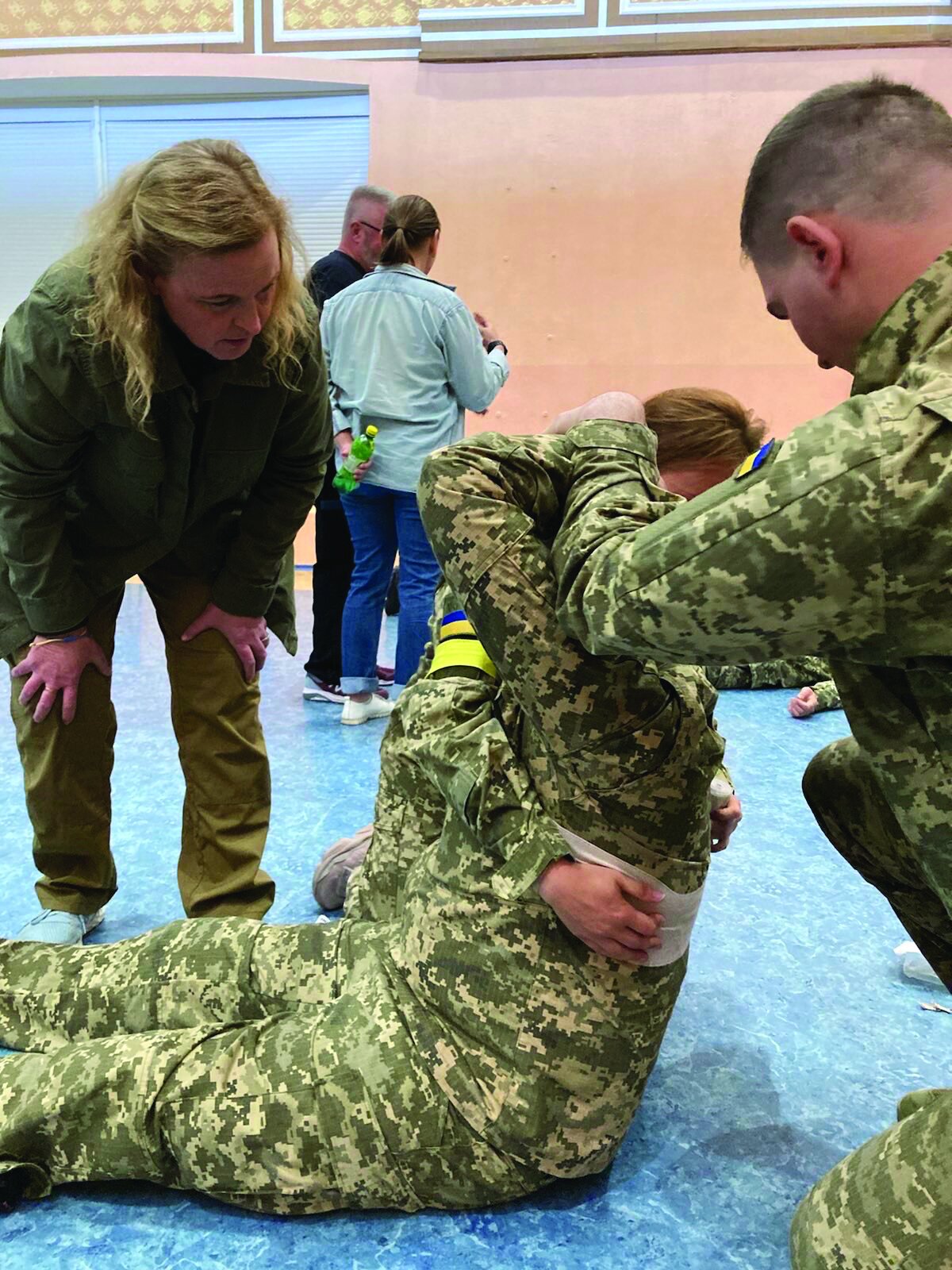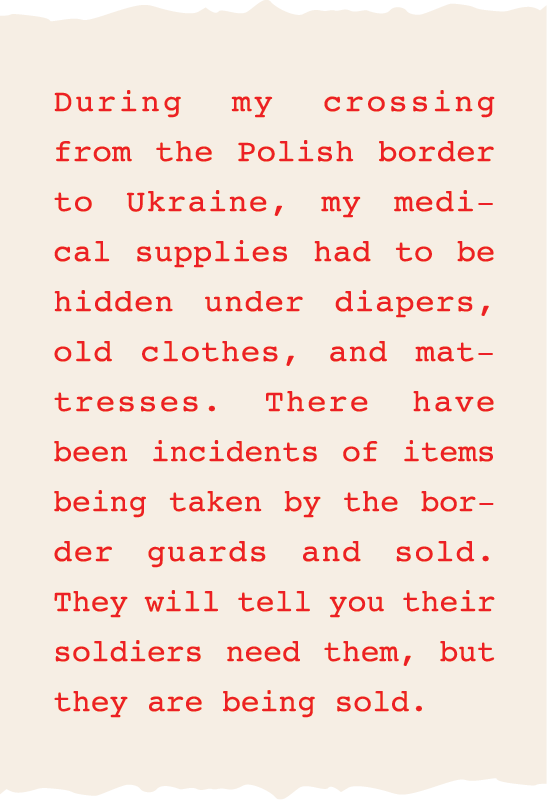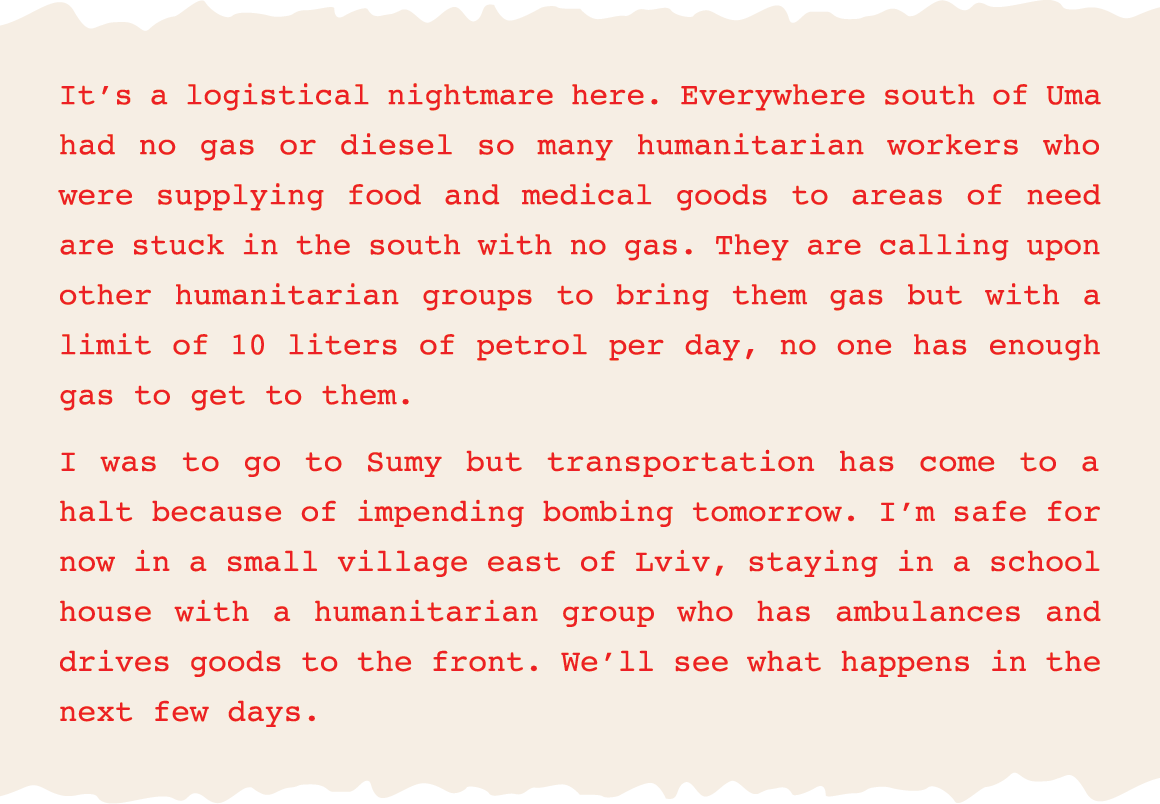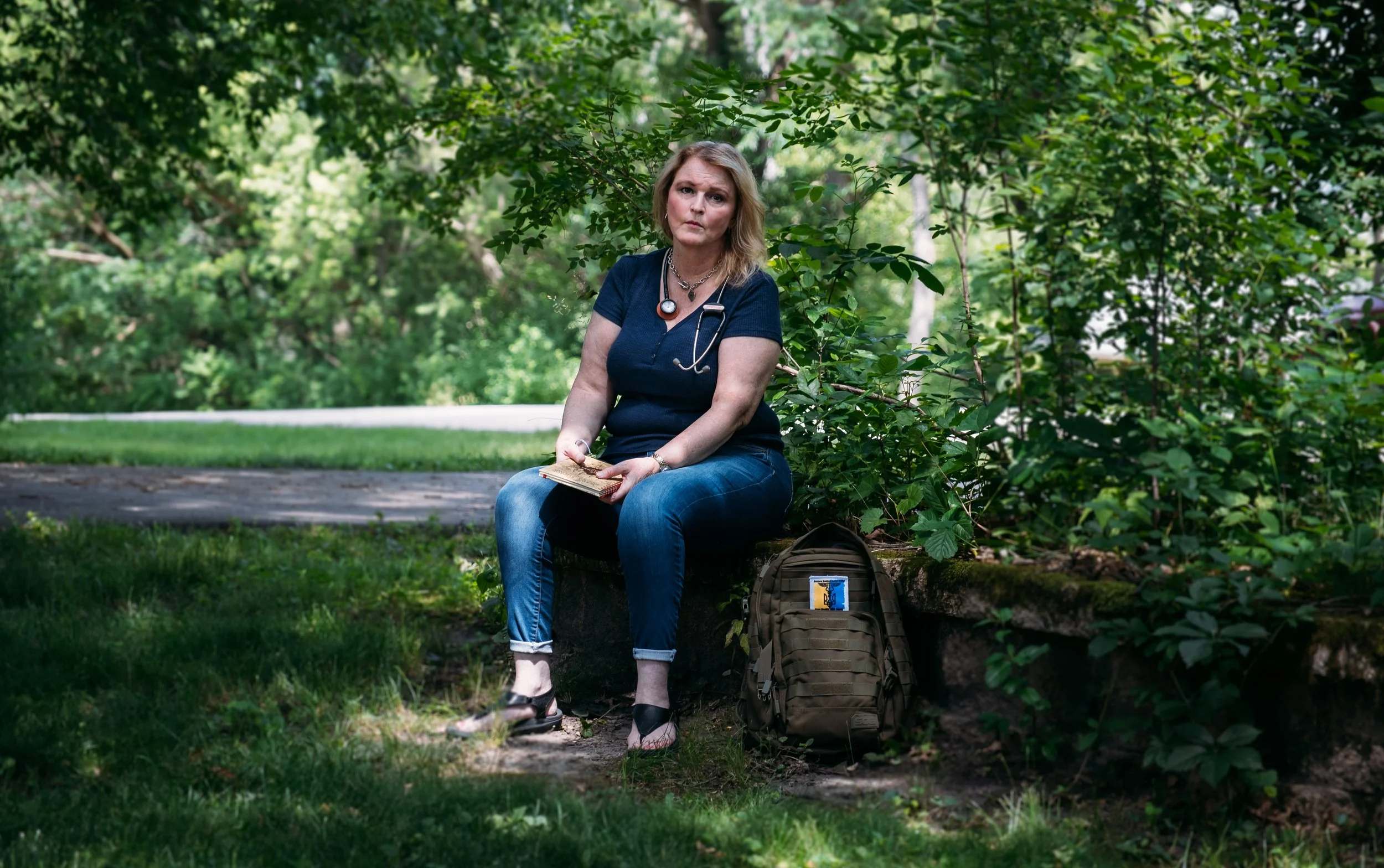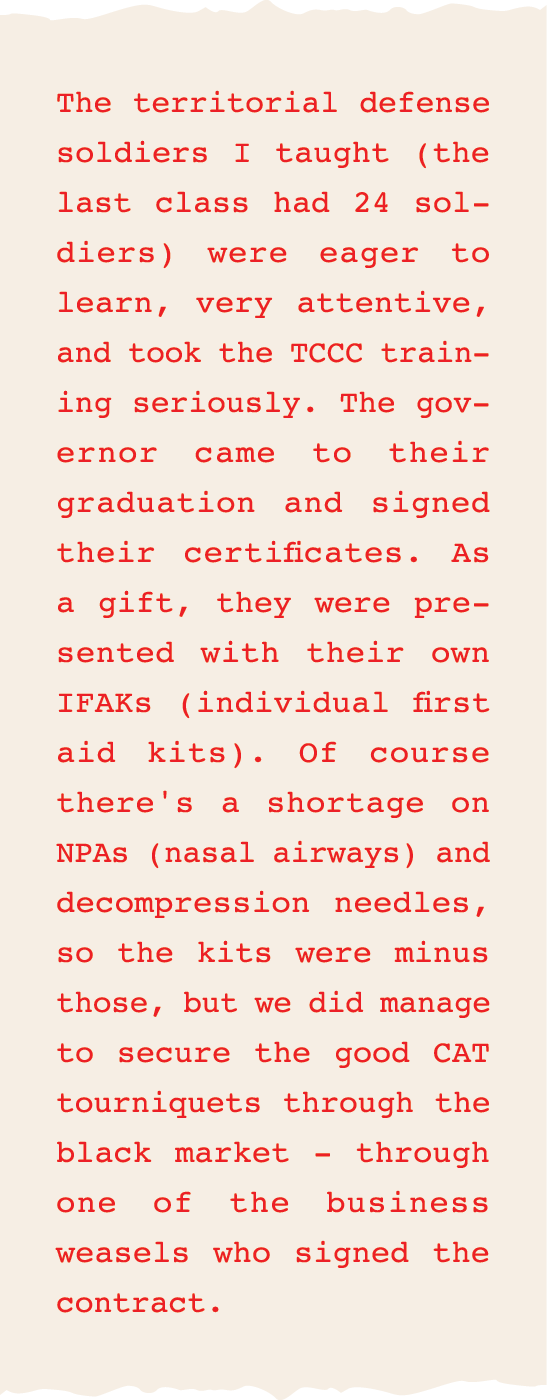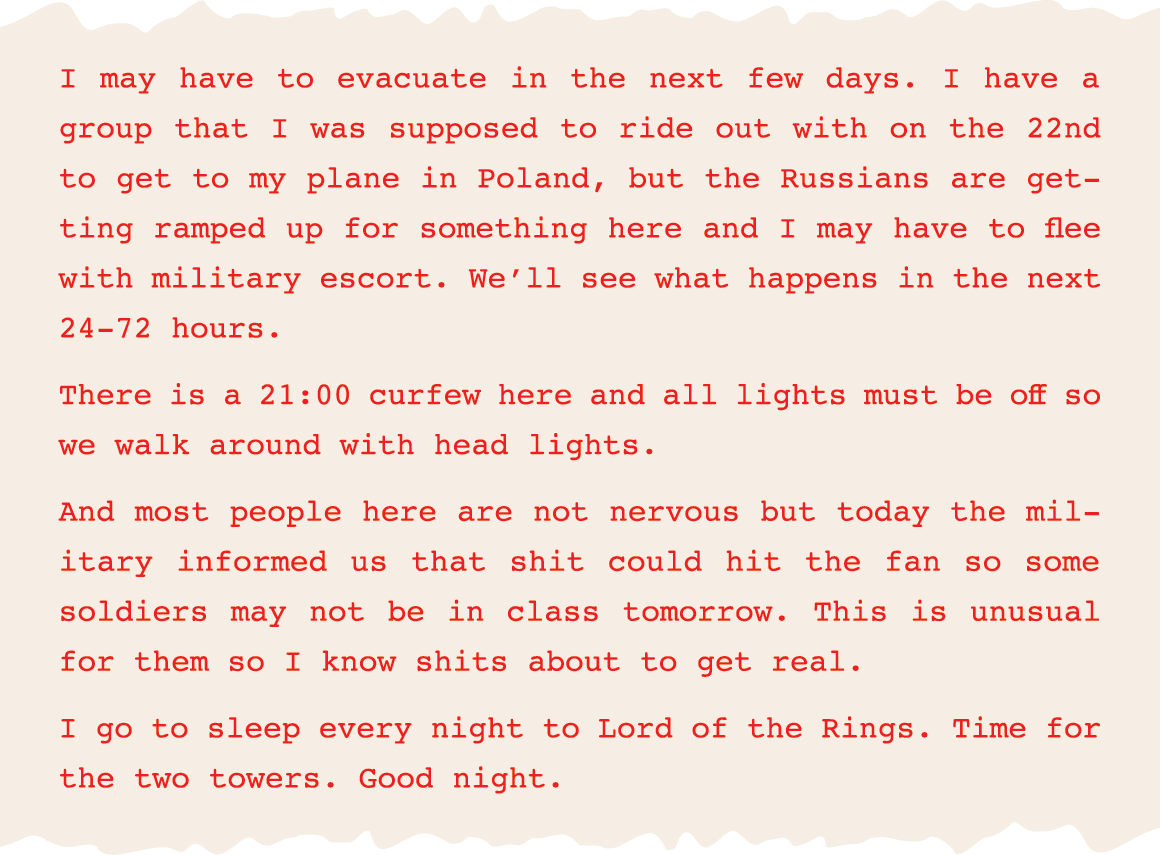Experiences from a war zone: Rochester woman returns from humanitarian mission in Ukraine
On her mission to deliver medical supplies and training to soldiers and civilians in Ukraine, Ashlea McLeod, PhD, PA-C, encountered the gamut of the human spirit: pure-hearted NGO volunteers, military and medical heroes and imposters, extremists “playing war,” and refugees left in the lurch.
The remarkable journey started in front of her television.
On CNN, Colonel Andrew Milburn, CEO of The Mozart Group, was explaining that soldiers and civilians are dying from simple things, like not knowing how to use a tourniquet. That they lack training and medical supplies on the front lines. That the few existing trained medics are at the frontline, leaving civilians on their own.
McLeod knew she had the skills to help. An ICU nurse for 12 years before becoming a physician assistant, McLeod has taught at nursing schools, trained medics, paramedics, and EMTs, and earned advanced trauma, life support, and pre-hospital trauma certifications. She’s also been to every continent aside from Antarctica.
Last fall, McLeod did quarantine, field, and emergency medicine at Fort McCoy with Afghan refugees. There, she made some connections with Allied Extract Group, a non-government organization (NGO) which had formed in the wake of the U.S.’s withdrawal from Afghanistan. The group provides humanitarian extraction, combat medicine, casualty care, and logistics help. They connected her with Austere Medical Relief Group, which utilizes a strict vetting process and strong relationship with the Ukrainian military to provide medical training to soldiers and civilians. It is the only program of its kind in Ukraine signed directly with the government.
Her mission would be two-fold — bring medical supplies to those who need them, and provide medical training for soldiers and civilians.
Courtesy Ashlea McLeod
Individual first aid kits (IFAKs), which hold tourniquets, trauma bandages, and other essentials, are among the most crucial things in short supply. McLeod collected 100 of them before leaving, as well as some medic bags for paramedics. Donations came from Allaquix, friends, relatives, and McLeod herself. She sent seven boxes by UPS to AEC parcel services, which is shipping things to Ukraine at a discount, and carried another six bags of supplies on her person.
Before leaving, she also bought a burner phone with a global system and VPN, and switched communications to Signal only once she arrived in Europe. We communicated over Signal while she worked her way from Poland into Ukraine. She has allowed us to quote from those chats, as well as from a journal she made on her way out of the country.
On April 30, she left Rochester, bound for a war zone. She would land in Krakow, then take a train to the border.
“You have to be really flexible with your travels. And sometimes onboarding can take several days. You're not just going to take a train to leave and say, ‘Hey, I'm here,’” she told us.
By May 3, McLeod was in Poland, on the border. That’s where she got her first whiff of the chaotic mix of wary locals, mostly-well-intentioned NGO volunteers, and wartime thieving.
“One man who arrived a few hours after me was drugged and robbed in his hotel room by the owners,” she says. Another man, a U.S. military vet and forest firefighter, had collected $250,000 in medical supplies and transported them from Montana to New York. An organization there promised to ship the goods to Poland and pay for his transportation so he could deliver the goods. None of that happened. When he made it to Poland (on his own dime), he found that his supplies had been posted on the internet for sale.
On May 4, McLeod made it across the border. The crossing, scheduled for noon, didn’t occur until 6 p.m.
Because so many NGOs had set up shop in Lviv, no rooms were available, so McLeod stayed in the outskirts of the city. “There are literally hundreds of NGOs in Ukraine. In Lviv and Kyiv, you can’t throw a rock without hitting one. Lots of Americans, Canadians, Brits, Polish, and a few Germans here and there,” she wrote. “About 10 percent have integrity and good staffing. Some NGOs are not corrupt and mean well, but are naive and trying to make decisions from the U.S. when they know nothing about the ground rules in Ukraine.”
In Lviv, McLeod taught Tactical Medical Courses to international volunteers at a school house in a small village nearby. This school also housed and fed roughly two dozen refugees, funded by an NGO.
While there, she saw firsthand where some mistrust of NGOs emanates from. She encountered a Canadian NGO working to transfer sick and wounded soldiers. The group had no vehicle and no paramedics. Another Canadian NGO wanted to deliver goods to war ravaged areas and help locals with medical responses to shelling, but had purchased a trio of non-functioning vans.
“[Their CEO] additionally had not vetted volunteers, so there were mentally unstable 21-24 year olds with no military background, no medical background, and no college or vocation. Their main goal was to 'get into the action' and when they weren’t driving around, they were on Tinder,” says McLeod.
McLeod also encountered people who were lying about military service and medical training. The most egregious example was a British man in his early 20s who was in charge of medications at the schoolhouse. He claimed to have been a high-level medic discharged due to injuries and would continuously interrupt McLeod’s lessons. In fact, as a source in the British Special Air Service revealed, he had only spent three days in the military before being kicked out. He was removed from the schoolhouse. But when an NGO pulled funding, he wound up taking control of the school using personal donations — last McLeod knew, he and his girlfriend were living in a classroom.
By May 12, McLeod had made her way to Sumy, roughly 20 kilometers from the Russian border. There, she connected with a team of two local doctors.
McLeod taught tactical combat care, or TCC. This retrains medics to think about things from a combat perspective. In essence, stopping the bleed is prioritized above all else.
“If you can't stop the bleeding, then it doesn't matter whether they're breathing or not. Usually in a combat situation, you have about two minutes for them, and they're going to bleed out,” says McLeod.
Ashlea McLeod / Photo by William Forsman
“Without this training thousands of soldiers will go into battle with no knowledge on battlefield medicine and no equipment causing more loss of life for civilians and military alike,” says Tanner Larsen, executive director of the Sumy Institute of Tactical Combat Medicine.
McLeod also taught suturing skills to some of the doctors and surgeons there, like how to tie off an artery with a figure 8 suture pattern.
In Sumy, McLeod’s students were members of the Ukrainian Territorial Defense — citizens who have taken up arms to protect their homes/villages. Conscripts to the territorial defense don’t get weapons, armor, uniforms, or training — most have never fired a gun.
Through the course of their training, it became obvious to McLeod that the soldiers lacked basic tactical training; they walked into dark rooms without looking around corners, did not return fire when fired upon, and didn’t crouch behind cover. Both companies failed their field test, and 22 of the 24 soldiers stepped on the same booby trap in one exercise.
McLeod learned more about how things work on the ground. When AMRG signed a contract with the Sumy government to teach courses, the contract mandated that certain business people get a cut, despite not having much to do with the relief efforts.
“It’s a well known fact in Ukraine that, if you want items to go into the hands of soldiers or civilians — you have to deliver it yourself or use a very trusted friend, which are hard to come by,” says McLeod.
Russian Federal Security Service (FSB) agents were also prevalent; McLeod says that five were identified on the Sumy campus alone.
On May 17, air sirens started going off.
AMRG was in daily contact with McLeod, making sure she was safe. In one instance, they got intel that Sumy was going to be attacked and immediately offered to buy everyone a train ticket out of harm’s way. It turned out to be a false alarm, and McLeod ended up staying to finish teaching. She left Sumy on May 22.
By May 25, she was in Krakow, and on May 26, she texted us from the airport in Chicago.
To learn more, visit AMRG’s website, www.theamrgroup.org. You can also donate to support Tanner Larsen and the Sumy Institute of Tactical Combat Medicine's efforts here.
Bryan Lund is a Rochester-based writer and regular contributor to Med City Beat
Cover photo by William Forsman
The full version of this story appeared on the cover of the July edition of The Beat Monthly. A digital version of the publication can be found here.




